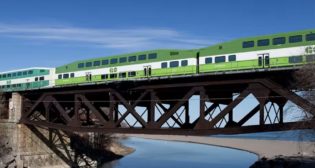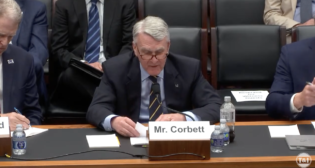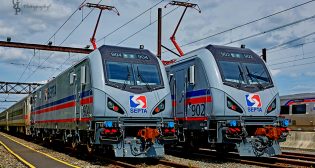
Amtrak Riders’ Revolution: “No Confidence” for Richard Anderson
Written by David Peter Alan, Contributing EditorNew Jersey calls itself “The Crossroads of the Revolution” in its promotional literature and advertisements. Not only was it centrally located during America’s War for Independence, but its troops under George Washington were tested against both the heat and the British at the Battle of Monmouth in June, 1778 and against the coldest winter of the century, 1779-80, at Morristown. Both times, and on other occasions, it met the challenges and went on to help establish our nation.
Today there appears to be another revolution finding its genesis in the Garden State, far less bloody but sweeping in its own way. It is just beginning, but Amtrak’s riders in New Jersey and elsewhere are expressing their frustration with Amtrak under its President, Richard Anderson, and the way we who ride Amtrak trains have been treated since he assumed the top job at “America’s Railroad” slightly more than one year ago.
The word “we” is appropriate here, because this writer has played a central role in this drama, which pits Amtrak and its political allies against riders who are fed up with service reductions, loss of travel amenities and plans by Anderson and his minions that could make conditions even worse for Amtrak’s beleaguered riders (and New Jersey Transit’s, too). Over the past two decades, this writer has authored roughly 1,000 commentaries, news stories, statements and other works about the state of trains and transit in New Jersey and elsewhere in the nation. This piece will not be like any of them. It is not a news story, because this writer is precluded by circumstances from displaying the journalistic detachment required for fully objective news coverage. It is not an essay either, because the subject is far broader than merely personal issues that concern our rail service. Maybe it is a valedictory in a sense, even though this writer plans to keep writing, both here in Railway Age and elsewhere.
New Jersey is uniquely positioned to ignite the spark that could start the struggle for a better Amtrak, perhaps along with a better NJ Transit, too. It has two active rider-advocacy organizations: the Lackawanna Coalition (of which this writer is Chair) and the New Jersey Association of Railroad Passengers (NJ-ARP), which independently took a similar position to the Coalition’s about Anderson. New Jersey has also contributed several members to the Rail Users’ Network (RUN), the sole organization of national scope that has also expressed “no confidence” in Anderson.
New Jersey has a history of involvement with Amtrak in other ways, too. Two Amtrak presidents came from the rough-and-tumble world of transportation politics in the Garden State: Thomas M. Downs (1993-97) had been New Jersey’s Transportation Commissioner before joining Amtrak. He became infamous for the draconian “Mercer cuts” that eliminated several corridor-length trains and reduced frequencies on almost all Amtrak long-distance trains to three or four days per week, and his leadership continues to draw fire for “purging” Amtrak of good managers, a practice that appears to continue to this day.
Downs’ replacement, the late George D. Warrington (1997-2002), came directly from NJ Transit. Warrington restored most of the long-distance trains to daily operation in 1997, although he also discontinued the Pioneer and the Desert Wind completely. The rest of his tenure at Amtrak was stormy; he also established a negative reputation, and he came back to NJ Transit as Executive Director when Democrat James McGreevy was elected Governor. Longtime U.S. Senator Frank R. Lautenberg (D-N.J.) was one of Amtrak’s most vocal supporters until he died in 2011. With such strong involvement by New Jerseyans with Amtrak in both management and politics, it comes as no surprise that other New Jerseyans should also be heavily involved with it as advocates.
To be sure, advocates from outside the Garden State have also questioned Amtrak’s current policies. Chicagoan M.E. Singer, who calls himself a “rail provocateur,” posted 35 questions for Amtrak Executive Vice President and Chief Commercial Officer Stephen Gardner in these pages on December 26, much like Martin Luther posted that number plus 60 “theses” on a church door 500 years ago. Minnesotan Andrew Selden also criticized Gardner here on Jan. 4. The Indiana Passenger Rail Alliance (IPRA) has also objected to Amtrak’s airline-oriented business practices under Anderson. Ironically, so far, the nation’s largest passenger rail advocacy organization, the Rail Passengers Association (RPA), formerly the National Association of Railroad Passengers (NARP), has expressed no objection to Amtrak’s conduct and, in fact, has not even mentioned it in its most recent communications with its members.
There are two possible explanation’s for RPA’s silence: The organization could be working silently behind the scenes to get the facts before taking a position, or it could be treating the issue with benign neglect in an effort to avoid jeopardizing its commercial relationship with Amtrak.
Still, it is New Jerseyans living in the heart of the Northeast Corridor (NEC) who have unequivocally said “NO” to Richard Anderson, citing not only NEC-related issues but also the current pathetic state of Amtrak’s few long-distance trains, as grounds for their objections to him.
Among the New Jersey advocates, NJ-ARP fired the first shot. It came in the form of a densely packed five-page letter to Amtrak Board Chair Anthony Coscia, dated July 10, 2018 and signed by the organization’s President, Leonard Resto, and Vice President Joseph Versaggi. It began: “The New Jersey Association of Railroad Passengers has grave concerns over the future of Amtrak under the stewardship of President and CEO Richard Anderson.”
NJ-ARP then summarized its grievances: “Despite Amtrak being granted the largest-ever appropriation by Congress, directed at both the Northeast Corridor (NEC) and National Network accounts, President Anderson’s six months of behavior and action on the job belies what appeared to be a promising signal that Congress was ready to invest in its national rail network. President Anderson has missed no opportunity to display negativity and contempt for long-distance trains, which serve intermediate stations. In many cases, such service is the only public transportation available in numerous regions. President Anderson’s proposed course of route dismantling, station agency abolishment and food service downgrades will ensure that long-distance passenger rail service, as we have known it, will come to an end. His actions are out of the playbook of the 1960s Southern Pacific and Penn Central, which ended in failure and the U.S. having to nationalize the rail network.”
The letter went on to examine the Southwest Chief situation, the loss of ticket agents at a number of stations and the food service downgrades in detail, and concluded by recommending that Anderson be fired: “We ask: ‘Is this any way to run a railroad?’ The answer should be a resounding no. It is an American embarrassment that we lag behind every civilized Western nation in our rail service. In fact, we dare say some third-world countries have better rail service than the U.S. Mr. Anderson was considered to have done an ‘excellent’ job in the airline industry. However, by what measure? If measured by an increase in stock price, then he did a good job. However, the airlines serve passengers and, when Mr. Anderson left Delta, nary a tear was shed. Nary a tear will be shed when he is given his walking papers by the Amtrak Board of Directors. We suggest that Amtrak replace Mr. Anderson forthwith, with a Happy Meal in hand.”
RUN fired the next shot. It came in the form of a resolution approved at its Board meeting on Sept. 8, 2018 and was transmitted by letter dated Sept. 14, signed by Board Chair Richard Rudolph and sent to the Chairs of the House and Senate Transportation Committees and other concerned members of Congress on behalf of the RUN Board (which includes this writer). It began: “We are writing on behalf of the Board of Directors of the Rail Users’ Network which represents the interest of all rail passengers—long-distance, commuter and rail transit riders, to convey our concerns regarding the performance of Richard Anderson, the new President of the National Railroad Passenger Corp. (Amtrak). At our most recent meeting, the Board unanimously adopted a resolution of no confidence and requested that the appropriate House and Senate Transportation Committees conduct hearings regarding his actions, which are threatening the very existence of the national train network without justification and apparently without authority to do so.” The letter blasted Anderson for his emphasis on corridors at the expense of the national network, in violation of Amtrak’s governing statute. RUN especially criticized the plan to eliminate the Southwest Chief from the network and replace the middle of the route with a long bus ride.
RUN’s request, stated at the conclusion of the letter: “Because of the many detrimental actions, in-actions and recommendations which are stated above as well as the other items listed in the attached Bill of Particulars, we respectfully request that Mr. Anderson’s competency be evaluated by the House Transportation Committee before the national rail passenger system further deteriorates and current ridership as well as future growth is destroyed. As a very important part of the national transportation picture, passenger rail should be provided the necessary funding and oversight so generously given to the other modes of transportation that is essential to our nation’s economic vitality. Passenger rail must never again be allowed to be so diminished in this country. It must be enhanced and given the opportunity it deserves to once again unite communities large and small along its current and envisioned new routes.”
In addition, RUN attached a Bill of Particulars against Anderson that consisted of 21 separate allegations of conduct that was detrimental to the Amtrak network. It began: “Since becoming President of the National Railroad Passenger Corp. (Amtrak), Richard Anderson has made decisions and implemented policies to the detriment of the Corporation and its customers. These acts have threatened to destroy the existing Amtrak network, alienated constituencies whose support is vital to Amtrak, and severely reduced the sort of amenities and services that have attracted the public to rail travel.” This writer prepared the original draft of the document and submitted it to the rest of the RUN Board. It was modeled after a great Bill of Particulars from history: the one that Thomas Jefferson alleged against British King George III in the Declaration of Independence in 1776. The “rebellion” by New Jersey advocates against Amtrak’s Anderson was gaining momentum.
The Lackawanna Coalition approved its own resolution calling for “No Confidence” in Anderson on Aug. 27, 2018 in principle and approved the final wording on Sept. 24. The resolution cited several policies by Anderson that would lead to decreased Congressional support for Amtrak, including discouraging riders by eliminating amenities and services. The Coalition stressed the need for Amtrak funding to continue, citing projects on the NEC like replacing Portal Bridge and building more tunnel capacity between New Jersey and New York, and noting the need to keep the NEC in a state of good repair. Many NJT trains, including those on the Morris & Essex and the Coalition’s other lines of concern use the NEC for access to Penn Station New York.
The resolution’s cover letter summarized the organization’s concerns: “We are especially concerned that, if Anderson succeeds in shrinking the Amtrak network, the result will be a loss of Congressional support for Amtrak, especially among members whose constituents stand to lose their Amtrak train. This scenario would have a detrimental effect on funding for projects that are vital to our region, including new tunnels into Penn Station and necessary ‘state of good repair’ projects.” The resolution itself declared support for the effort in Congress to require Amtrak to operate its entire existing passenger rail network, declared “no confidence” in Anderson, and called on Amtrak’s Board of Directors “to replace him with a successor who is not taken from the ranks of current senior management at Amtrak.” While it did not mention him by name, the resolution made it clear to knowledgeable persons that Stephen Gardner would not be an acceptable replacement.
The advocates are writing and speaking out, in the hope of getting better management at Amtrak, which they also hope would mean better trains. It is a step that could not have been predicted in 2017, when veteran railroader Charles “Wick” Moorman was running the railroad and doing his best to bring Penn Station New York into a state of good repair. New Jersey’s advocates know trains and know politics, which in our state always takes strange turns that anyone outside of New Jersey itself, New York or Chicago would find bizarre, whether New Jersey is led by Democrats or Republicans.
Neither can New Jersey’s advocates run away from their connections to the past. Some of the leaders of the Lackawanna Coalition and NJ-ARP today fought against the former Access to the Region’s Core (ARC) Project a decade ago, because that project had changed for the worse so drastically that we could no longer support it. James T. Raleigh (1934-2013), a genuine rocket scientist (Bell Labs and NASA), did battle with the state’s politicians as Legislative Director of the Coalition. He had a historical connection to the original Revolution, too. For many years, he was the President of the Friends of Monmouth Battlefield, and he had studied General Washington’s tactics extensively. He was likened to Ben Franklin in an obituary. Franklin himself had a “transit” connection to New Jersey. Burlington was the capital of West Jersey and Perth Amboy was the capital of East Jersey. Both communities are served by NJ Transit today, but Franklin once ran a stagecoach line between them.
The ARC Project had morphed from access to Grand Central Terminal for New Jersey riders to a deep-cavern, dead-end terminal way below Macy’s basement on 34th Street. The campaign against it gained support from RUN and NARP on the national level, and gathered allies from several other states. Eventually, in the fall of 2010, Gov. Chris Christie (a Republican) woke up to the fact that it had many undesirable features, not the least of which was an unaffordable price tag. He canceled the project, despite support for it from the entire business, labor and political communities, Democrats and Republicans alike. It was the greatest victory that grassroots rider-advocates unconnected to political leaders had ever achieved.
The advocates later attempted to convince Christie and his transportation officials to build a project that was more cost-effective, but Sen. Frank R. Lautenberg (a Democrat) and Amtrak President Joseph Boardman introduced the Gateway plan only four months later. History may repeat itself with Gateway, especially in light of recent developments, and we plan to report to you here about Gateway and the advocates’ current campaign for a better solution. New Jersey’s advocates had won the war but lost the peace, much like Woodrow Wilson, President of the United States at the time and a former New Jersey governor, did a century ago.
Time will tell what will happen with Anderson, Gardner and Amtrak itself. A lot of mobility in New Jersey and elsewhere in the country is at stake, and New Jersey’s advocates, including this writer, know it. George Washington never backed down, and New Jersey’s current advocates have no intention of backing down, either.
The battle lines have been drawn, and it is Advocates vs. Anderson. Many of the advocates on the front line are from New Jersey.
That is no coincidence.
David Peter Alan lives and practices law in New Jersey. The opinions expressed are his own, and do not necessarily reflect those of any other individual or organization. A story about the Lackawanna Coalition resolution can be found on its website, www.lackawannacoalition.org, and in its newsletter, the Railgram. The RUN documents are located at www.railusers.net. Click on “About/Join” and then on “Testimony & Statements” to view the letter and Bill of Particulars. IPRA’s objections can be found in the July 2018 issue of its newsletter All Aboard Indiana. The NJ-ARP letter cited here has not been published on its website.
Editor’s Note: See also these two pieces from Capitol Hill Contributing Editor Frank N. Wilner:
A Failure of Public Enterprise?
Amtrak’s Anderson not a random choice


